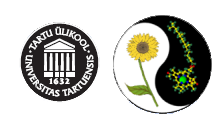Research
Our research is focused on experimental and theoretical investigations of molecular processes of photosynthesis, of spectral properties of photosynthetic chromoproteins, and of stability of integral membrane proteins under high hydrostatic pressure. A long-term goal of these studies is a deeper understanding of the basic physical mechanisms of biomolecular functioning as well as of biocomplexity.
Research directions
Polarons in light harvesting: Lessons from natural nanoworld
Unraveling the hidden nature of photosynthetic antenna excitations
Fine-tuning of the antenna spectra
Selective spectroscopy of biomolecules
Protein mechanics and stability
Barochromic (pressure-dependent) studies of electronic excited states
Methods, instruments and facilities
Various advanced laser spectroscopic techniques (ps-ns-range time-resolved fluorescence spectroscopy from near IR to UV, high-resolution hole-burning and fluorescence line-narrowing spectroscopy, high-pressure spectroscopy), and computational physical modeling are used to study biophysical systems and processes.
Current projects
-
PRG664, New Insights into Photosynthetic Excitations Enabled by High-pressure Perturbation Spectroscopy, 1.01.2020−31.12.2024, Arvi Freiberg
-
PSG264, Energy transfer in the photosynthetic unit of green sulphur bacterium, 1.01.2019−31.12.2022, Juha Matti Linnanto
Cooperation partners
- Grenoble Alpes University, Prof. Judith Peters
- University of Turku, Prof. Esa Tyystjärvi
- Arizona State University, Prof. Neal W. Woodbury, Prof. James Allen, Dr. Su Lin
- CEA-Saclay, Prof. Bruno Robert
- Free University of Amsterdam, Prof. Rienk van Grondelle
- Johannes Gutenberg University Mainz, Prof. Harald Paulsen
- Lund University, Prof. Villy Sundström, Prof. Tõnu Pullerits, Dr. Ivan Scheblykin
- Max Planck Institute for Bioinorganic Chemistry, Mülheim, Prof. Alfred Holzwarth
- University of Sydney, Prof. Jeffrey R. Reimers
- University of Bayreuth, Prof. Jürgen Köhler
- University College Dublin: Prof. David Coker
- University of Sheffield, Prof. Neil Hunter, Dr. John D. Olsen
- Vilnius Institute of Physics, Dr. Gediminas Trinkunas
- Technical University of Berlin, Prof. Thomas Friedrich, Dr. Franz-Josef Schmitt
- Humboldt University of Berlin: Prof. Athina Zouni
- Technical University of Munich: Prof. Peter Müller-Buschbaum, Dr. Wiebke Lohstroh
- Lomonosov Moscow State University: Dr. Evgeny Maksimov
